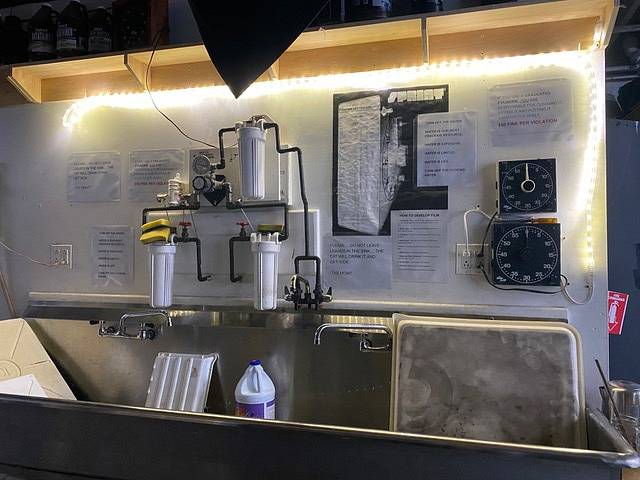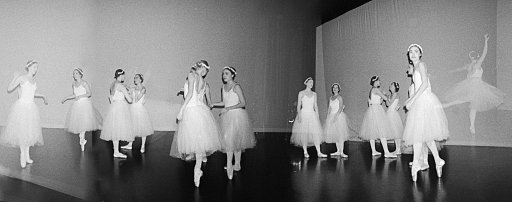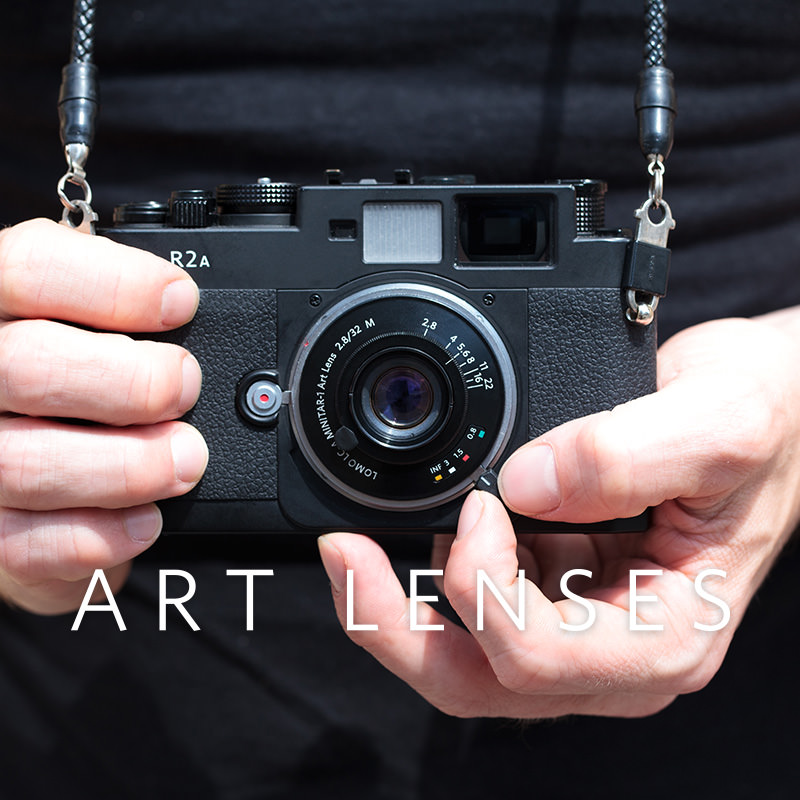Darkrooms and Film Labs: Bushwick Community Darkroom
10 Share TweetNecessity is the mother of invention, so when Lucia Rollow graduated from college looking for a space where the artistic community could gather and didn't find one, she simply created one. It's been 10 years since Lucia and her boyfriend crowdfunded what later became the "Bushwick Community Darkroom".
"I didn’t see a space in New York that was just a space you as an analog photographer could go and either work on your own work or just interact with other like minded people."
What started with as a few trays and counters, became a DIY darkroom in a closet in the basement of a loft in 2011, and finally a fully serviced lab and studio in 2015 in a 4,000 squarefeet warehouse in Bushwick that today became a reference in New York's analog community. Lucia's own journey with analog started when she was around 5 years old with a 110 camera. At 12 years old, after taking an intro to Black White Photo Class, she was hooked. "That was basically the end of it for me," she says. "I haven’t been without darkroom access for more than a year since." We spoke to Lucia about the journey, challenges, and services that the Bushwick Community Darkroom offers.
When and how did it go from an idea to an actual space?
I graduated from the School of Visual Arts right after the last economic collapse in the spring of 2009 and there were basically no jobs. So I worked a few random jobs & went on unemployment for a bit, then started walking dogs. As I was walking the dogs I started to formulate this vision and plan in my mind. So I launched a Kickstarter at the end of 2010. I specifically chose Kickstarter because I wanted to know I had the community backing, if there was no demand the business would fail immediately. I figured out what a year of expenses would be, set the target and we reached it just before the deadline. So then we, mostly my boyfriend at the time and I, built some counters and set up some trays and I built a Squarespace website and we’ve grown organically since then.

What pushed you to open such a space?
My own selfish need. But also my desire for a space where I could work alongside people without necessarily working with or for those people. I also sensed a demand from my art school peers, a sort of sense of “What's next? Where do we go?”
Times were bleak in 2010 and I wanted to build a space where people could gather and figure out what our next steps needed to be to survive as artists and photographers.
I didn’t see a space in New York that was just a space you as an analog photographer could go and either work on your own work or just interact with other like minded people. Sometimes you want to see what other photographers are doing and what they have to say about your work and sometimes you don’t and those opportunities for feedback should arise organically based on people sharing a work space and slowly observing each others artistic evolution over a period of years, not weeks or months and certainly not in an environment where one person is being paid to “critique” another person's portfolio after just a few minutes of viewing.

In a digital era, why would you take on the idea of opening such an analog space?
It never has been and never will be a digital era. The two will always exist in parallel. There are some things digital is better for and there are some things film is better for. There are some people that are more digitally inclined and there are some that are less. There was no “idea of opening such an analog space” it was rather “What do I need to continue my artistic practice so I don't go insane?” and “Is there a possibility other people need the same thing?” and “Maybe we can share the resources since I know I do not need to be in the darkroom 24//365.”
What are the services you offer? Is one more popular than others?
We try to cover the whole spectrum so that anyone, from someone who just picked up a disposable camera to someone that has been shooting 4x5 for years can have their needs met. Our classes and drop off and hourly rental services were the most popular. Generally all our service categories each bring in about 20% of our revenue. Service categories include: Hourly rental, Drop off Service, Classes, Membership and Studio/Event/Misc income. During this pandemic, everything but membership has just been completely cut off. Classes and Drop Off Development were probably the most popular.
Who is your main audience? Do you have a regular clientele or a more punctual audience?
Most of our clientele is young men between the ages of 25-40, that is just the world of photography. As a woman owned business I think the other 50% of our community that is not men between 25-40 is pretty diverse and we are always trying to think of ways to be accessible to different people.
No one should ever feel belittled or condescended to or “less than” in this space. Everyone should be respected at all times for the things they bring to our little microcosm.
What is the craziest request you got?
Those people that really expect me to have kept their negatives for 2-3 years? We’ve gotten some crazy requests. But also what actually qualifies as crazy? We’re film photographers. We must be fundamentally crazy to begin with or we wouldn't be wasting all our time/money/energy on this tedious process! There is that guy who comes in every couple years to hand develop solarized color prints though, he wears a hazmat suit and it’s really intense but his work is gorgeous!
What are some of the challenges you face as a darkroom/lab?
Are they going to keep producing the chemicals/supplies we need to function? Basically all our equipment and supplies are from the 90s or earlier so if the 3 people currently making the things we need decided to stop it would be a big problem. It’s important for all of us who run community darkrooms and labs around the country and world to stay in communication and make sure we don’t let our supplies disappear. Kodak did a whole restructuring over the summer and communication really fell off and we were unable to get the correct color chemistry for our machines for almost 3 weeks, that was extremely frustrating.

Do you still have time to shoot? Do you have time to develop your own material?
I make time to shoot. I realized around 2014 that my mental health was significantly improved when I had an art project of my own that I was working on so I’ve made it a priority since then. I generally do one artist residency program a year where I go away for 2-6 weeks and focus only on my own art and things I can do remotely.
What are the measures you're taking to make your darkroom a sustainable/green environment?
Running a sustainable darkroom has proven to be a significant challenge. Obviously our chemistry is toxic but we filter out all the heavy metals before it goes down the drain as per the EPA regulations. We were using plastic sleeving for all the drop off film, but it can’t be used more than once and when we realized how much film people don’t pick up and thus how much of that plastic sleeving goes straight to the landfill we started returning film rolled up in the plastic film canisters in comes in when you buy it. That has been huge, you can reuse those canisters endlessly so now we’re barely throwing out any extra plastic. If we could figure out how to reuse our un-retrieved envelopes that would be great. There was a moment in the beginning when our quarterly water bill was up around $1500 so I posted a bunch of signs near all the faucets reminding people to turn off the water and now our water bill is generally around $600 each quarter. Some day we hope to either air seal our current building or move into one that has been air sealed, temperature control has proved a significant challenge. If people have any suggestions for things we can do we would love to have them emailed to us.

As a darkroom, what advice would you give photographers based on your knowledge from the post-shooting side?
So many thing. Mainly, don't be embarrassed to admit you don’t know something, there will always be something you don’t know. There seems to be a lot of ego involved with analog photography and I’ve just always felt like if everyone could put that aside we could all share our wisdom and be even stronger together. Also if something isn’t working with your film don’t attack your lab first, ask them what they think it could be. There are a lot of variables in photography, the chances that you’re always thinking of all of them are very small and that is ok, that is part of the fun, that’s the magic of the process.
During those times, the Bushwick Community Darkroom is only accepting mail in orders at this time. To find out more about Bushwick Community Darkroom's services, head over to their website , or shoot them an email at info@bushwickcommunitydarkroom.com
written by tamarasaade on 2020-04-21 #culture #news #people #places #tutorials #film-labs #film-lab-series #darkroom-revival
























No Comments